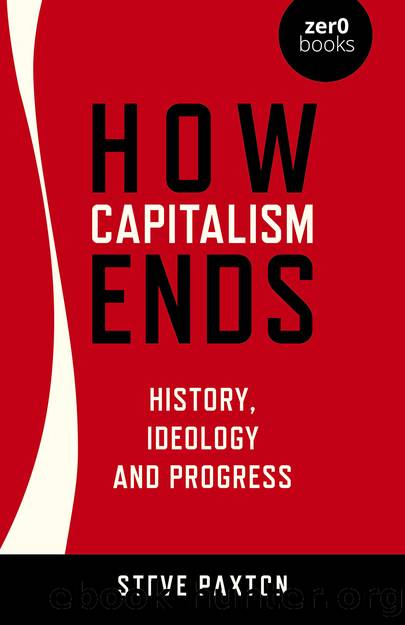How Capitalism Ends by Steve Paxton;

Author:Steve Paxton;
Language: eng
Format: epub
Publisher: National Book Network
Published: 2022-09-23T00:00:00+00:00
6.5 The Origins of Property Rights
If we can see through the haze of these attempts to construct a justification of the status quo, there is actually a serious question to be discussed about just how we should approach the distribution of resources in society. Nozick rejects any attempts to allocate resources according to some kind of pattern â hard work, social good, moral merit and so on, preferring an âentitlementâ approach in which resources rightfully belong to those who are entitled to them. (His use of the term âentitlement theoryâ is disingenuous as almost all approaches attempt to distribute resources according to entitlement â the disagreement is over what creates that entitlement, not whether or not something other than entitlement is the correct criteria.) What Nozick is really opposing is the idea that entitlement is based on some end-state objective or pattern of distribution, such as equality or sufficiency. He considers any assertion that all people should have an equal amount of resources â or even a sufficient amount of resources â to be a threat to the freedom of those whose resources may need to be redistributed in order to achieve such a goal. (Of course, in Nozickâs world, sufficiency â the right to life â for some, should not be considered more important than any infringement on the sacred property rights of others.) Weâve already dispatched the idea that losing property can be treated as an infringement of freedom, by those (such as Nozick) who assert that property ownership isnât a requirement of freedom. Here weâll examine Nozickâs approach from a different angle. As weâve seen, he argues that people are entitled to whatever they can amass by fair means, but this approach brings a whole range of both theoretical and practical problems of its own. The practical problems begin at the beginning â with the original appropriation of the natural world into private property. At some point in pre-history, humans began to take ownership of natural resources. Instead of just using what was available, people began to claim permanent rights over things, then to extend those rights beyond their lifetimes by making their property bequeathable to their heirs. In the late seventeenth century, John Locke developed a theory of acquisition to defend the institution of private property, and to justify the increasing conversion of common land into private pasture under the process of parliamentary enclosure. (A process which by 1850 had seen the people of England deprived of their customary access to around 9 million acres of land â all in the name of freedom.)185
Like Nozick and Hayekâs attempts to give the market a moral justification of âbenefit to othersâ by continually omitting the real details, Lockeâs justification of private property is a sleight of hand designed to attribute noble origins to theft and self-interest. Locke begins by noting that the world in its âstate of natureâ existed for the benefit of all âmankind in commonâ acknowledging the great difficulty in discerning âhow any one should ever come to have a Property in any thingâ.
Download
This site does not store any files on its server. We only index and link to content provided by other sites. Please contact the content providers to delete copyright contents if any and email us, we'll remove relevant links or contents immediately.
| Africa | Americas |
| Arctic & Antarctica | Asia |
| Australia & Oceania | Europe |
| Middle East | Russia |
| United States | World |
| Ancient Civilizations | Military |
| Historical Study & Educational Resources |
Never by Ken Follett(2880)
The Man Who Died Twice by Richard Osman(2299)
Machine Learning at Scale with H2O by Gregory Keys | David Whiting(2291)
Fairy Tale by Stephen King(2069)
Will by Will Smith(2042)
Rationality by Steven Pinker(1765)
The Dawn of Everything: A New History of Humanity by David Graeber & David Wengrow(1570)
The Dark Hours by Michael Connelly(1570)
Principles for Dealing With the Changing World Order: Why Nations Succeed and Fail by Ray Dalio(1373)
Friends, Lovers, and the Big Terrible Thing by Matthew Perry(1327)
A Short History of War by Jeremy Black(1300)
HBR's 10 Must Reads 2022 by Harvard Business Review(1256)
Go Tell the Bees That I Am Gone by Diana Gabaldon(1234)
Can't Hurt Me: Master Your Mind and Defy the Odds - Clean Edition by David Goggins(1227)
515945210 by Unknown(1207)
Fear No Evil by James Patterson(1109)
443319537 by Unknown(1072)
Works by Richard Wright(1018)
Going There by Katie Couric(991)
